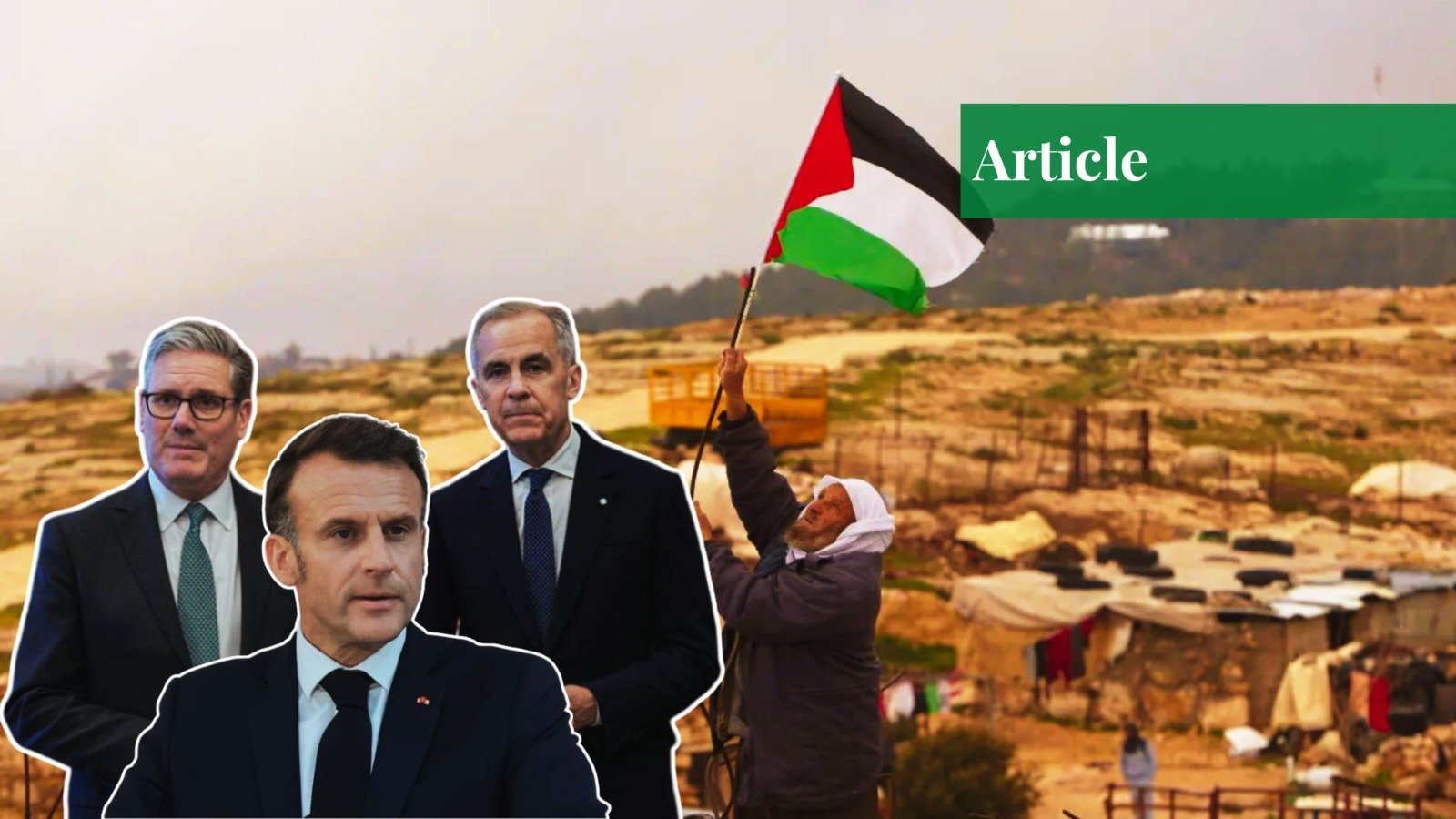Following the New York Declaration, successfully signed by 142 states, Western US allies, including the UK, Australia, France, and Canada, among others, recognized Palestine’s statehood and emphasized the need to holistically implement the two-state solution to revive peace in the Middle East. These moves marked a diplomatic shift in international acknowledgment of the Palestine question, considered symbolic but likely to pressure Israel and the US toward the long-awaited establishment of a Palestinian state.
Global Momentum For the Recognition of a Palestinian State
This month marked an international united effort to end Israel’s war on the Palestinian people, who have lost nearly 65,000 lives since the October 7 Hamas attacks, which killed around 1200 Israelis. The UK’s recognition on 21 September can be seen as a historical correction, coming 100 years after the Balfour Declaration and eight decades since the creation of Israel. A remarkable moment for Palestinians was the flag-raising ceremony at the Palestinian Embassy in London, marking the establishment of diplomatic relations with the UK.
On 22 September, Saudi Arabia and France co-hosted an international conference at the UN on the two-state solution. This historic summit was characterised by several European states, including France, Andorra, Belgium, Luxembourg, Malta, and Monaco, recognizing Palestinian statehood. All these states also condemned the October 7 assault and stressed the urgent release of Israeli hostages. During the conference, France introduced a post-war proposal that addressed the Israeli demands for a ceasefire, including reforms in the Palestinian Authority, disarmament, and exclusion of Hamas from politics. This plan was praised by Saudi Arabia and would help normalize Israel-Saudi Arabia relations, a keen interest of Israel.
Major Shifts in European States’ Policies
The dramatic shift in European and major G7 states’ (the UK, Canada, and France) policies towards the Israel-Palestine conflict has isolated the United States as the sole major supporter of Israel. Previously, these states were against the establishment of a Palestinian state unless its negotiations with Israel succeeded, but this time, the international community acknowledged that recognizing Palestine is important to uphold the two-state solution. Ireland, Norway, and Spain recognized Palestine in 2024, while Germany delayed under certain conditions.
These major recognitions showcase negative views of Israel across Western states and can intensify their economic and political pressure on Israel. In June, Australia, England, and other states imposed financial and travel sanctions on two Israeli officials (Ben-Gvir and Smotrich) for promoting discrimination against Palestinians and land occupations in the West Bank, and these actions were condemned by both Israel and the US.
Countries Now Recognize a Palestinian State
The major reason for the international unity toward Palestinian statehood is Israel’s ongoing devastating destruction in Gaza and its potential plans to occupy the West Bank, which could undermine the possibility of a two-state solution. Moreover, Israel’s recent attack on Qatar, a major mediator between Hamas and Israel, refused to negotiate again. This collective action can also protect states from unilateral accusations while supporting the legitimate principle of Palestinian sovereignty and could bring lasting peace for both nations. Public pressure, including opposition to Israel’s actions, pushed states to pursue international recognition, as Britain saw huge protests and 130 members of the Labour Party supporting Palestinian statehood. The main concern is that while this representation consolidates Palestine’s diplomatic and trade relations with these states, it will not end Israel’s war or become a permanent member at the UN, as the United States could veto it.
Trump Administration and Israel-Palestine Conflict
On 23 September, the US president addressed the UNGA, condemning Western states’ recognition of Palestine, viewing it as a ‘reward’ to Hamas. Both the US and Israel refused to attend the previous UN high-level meeting led by France and Saudi Arabia, while remaining firm on their ceasefire demands. The US also rejected a visa for Palestinian president, Mahmoud Abbas, who spoke to the UN via video, praising the states’ recognition of Palestine and pledging to cooperate with the US and the international community to achieve peace in Palestine.
On 22 September, the US organized a meeting with the leaders of Muslim states (Pakistan, Qatar, Saudi Arabia, and others) and presented a 21-point plan to achieve peace in Palestine, a US effort to end the war, contrasting with Israel’s approach, which undermines the two-state solution. The plan is characterized by the release of hostages within 48 hours, after which Israel’s forces would leave Gaza and refrain from attacking Qatar, supported by Arab states seeking a ceasefire in Palestine. Trump also stated that the US would not allow Israel to occupy the West Bank, according to press releases.
Israel’s Hardline Response
Most states walked out during Netanyahu’s address at the UNGA this Friday, showcasing increasing international pressure against Israel’s policies and fundamental solidarity with the Palestinian people, as more than 150 states have recognized Palestine. Israel condemned Western states’ recognition of Palestine as yielding to Islamist jihadist groups like Hamas at the expense of Israel.
Moreover, Israel vowed to eliminate Hamas by highlighting persistent threats of repeated attacks, and claimed that a Palestinian state would never be created. Meanwhile, Israel also applauded America for recognizing shared threats to both states. Hamas opposed Israel’s accusations, citing that Hamas is not the hurdle in peace negotiations. England, Australia, Canada, among other countries, emphasized in their address that it is not a prize for terrorism, but a step to uphold the two-state solution, which is supported by several African, South American, and Asian states.
Palestinians Call for Concrete Solutions
Palestinians praised the recognition of their statehood but noted its challenges and limitations. They considered the recognition largely symbolic unless the United States also recognizes Palestine. The US is the only permanent UNSC member that vetoed the resolution for an urgent ceasefire in Gaza on 18 September. Palestinian people want practical solutions to end this war, as the US could pressure its allies to retract this recognition. Therefore, US recognition would carry substantive significance compared to that of historical Western powers. Maryam Nassar, an International law analyst, concluded that it could escalate Israel’s land attacks on Palestinian civilians.
Will Countries Recognizing Palestinian Statehood Make Any Difference?
It will, only if concrete actions are taken. To enhance the impact of this international effort, states must impose strict trade and arms sanctions to pressure Israel to comply with International law. It could also provide Palestine with international standing in legal forums. In 2011, the UN recognized Palestine as an observer state, after which the ICJ issued arrest warrants for Israeli Prime Minister Netanyahu for alleged genocide in Gaza. This September, the UN Human Rights Commission also described Israel’s war as a genocide against the Palestinian people. Recognition from major Industrial states could pressure Israel to negotiate a ceasefire in the future, though it may not prompt urgent changes.
The recognition underscores that the voices of underprivileged and minority nations can be heard at the global level. The genocide in Gaza has questioned the legitimacy of legal forums such as the UN in establishing concrete solutions to end Israel’s war. Finland’s president criticized the UN veto power, stating that voting rights should be suspended if a state violates International law, including the UN Charter. Ultimately, peace between Palestine and Israel would bring prosperity to the Middle East.
If you want to submit your articles and/or research papers, please visit the Submissions page.
To stay updated with the latest jobs, CSS news, internships, scholarships, and current affairs articles, join our Community Forum!
The views and opinions expressed in this article/paper are the author’s own and do not necessarily reflect the editorial position of Paradigm Shift.
Maryam Iftikhar completed her degree in International Relations at Kinnaird College for Women University, Lahore and is passionate about global politics, international law, and climate justice.



